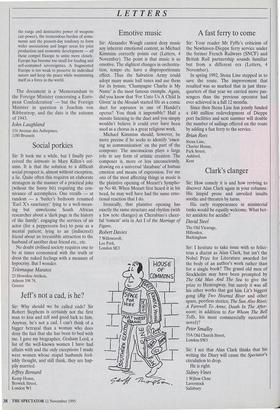Emotive music
Sir: Alexander Waugh cannot deny music any inherent emotional content, as Michael Kimmins correctly points out (Letters, 4 November). The point is that music is so emotive. The slightest changes in orchestra- tion, tempo etc. have a disproportionate effect. Thus the Salvation Army could adopt many music hall tunes and use them for its hymns; 'Champagne Charlie is My Name' is the most famous example. Again, did you know that 'For Unto Us A Child Is Given' in the Messiah started life as a comic duet for sopranos in one of Handel's operas? You think it impossible? Half a minute listening to the duet and you simply wouldn't believe it could ever have been used as a chorus in a great religious work.
Michael Kimmins should, however, be more precise if he seeks to identify 'emot- ing as communication' on the part of the composer. The unconscious plays a large role in any form of artistic creation. The composer is, more or Iess unconsciously, drawing on a universal 'database' of human emotion and means of expression. For me one of the most affecting things in music is the plaintive opening of Mozart's Sympho- ny No 40. When Mozart first heard it in his head, he may well have had the same emo- tional reaction that I do.
Ironically, that plaintive opening has exactly the same structure and rhythm (with a few note changes) as Cherubino's cheer- ful 'tomcat' aria in Act I of the Marriage of Figaro.
Robert Davies
7 Willowcroft, Lee Park, London SE3


















































































 Previous page
Previous page